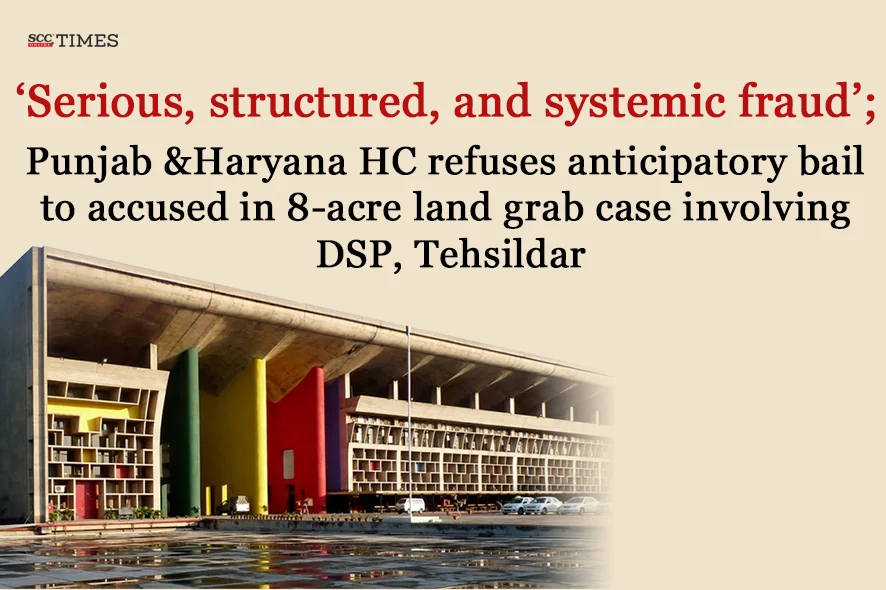Punjab and Haryana High Court: In a batch of anticipatory bail applications filed in connection with an FIR registered by the Central Bureau of Investigation(‘CBI’) against the accused persons under Sections 120-B, 452, 323, 506, 427, 148, 149,193, 408, 420, 467, 468, 471 of the Penal Code, 1860 (‘IPC’) for allegedly attempting to grab land belonging to a public trust, the Single Judge Bench of Manjari Nehru Kaul, J., rejected the applications holding that the there was no ground to extend the extraordinary concession of anticipatory bail to the accused persons given the seriousness of allegations, possibility of further interference with the trial, and imperative need for custodial interrogation.
Background
As per the CBI, the accused persons, in active connivance with various co-accused, including revenue officials, banking officers, a practising advocate, a registrar, police officers, and even judicial officers, executed a premeditated plan to grab approximately 8 acres of valuable land belonging to the Guru Nanak Vidya Bhandar Trust (‘the Trust’) by fabricating documents and manipulating legal procedures.
According to the investigation, it was allegedly revealed that a fake trust deed dating back to 1980 was prepared in 2021. Further, a forged Certificate of Registration dated 1980 purportedly issued by the Registrar of Societies, Government of NCT of Delhi, was fabricated to show legitimacy despite the NCT of Delhi coming into existence in 1991.
According to the CBI, the accused persons herein did not act in isolation but engaged in forum shopping, manipulation of legal proceedings, and recording of false statements, including an attempt to influence the course of judicial proceedings. It was further alleged that the applicants orchestrated a pressure campaign against the genuine manager of the Trust by filing two complaints with the specific objective of compelling him to support the forged version.
Analysis
The Court stated that, prima facie, the present case involved serious, structured, and systemic fraud, undertaken with the deliberate intention to grab land belonging to a public charitable trust. The seriousness of the offence was made worse by the involvement of public officials and legal professionals, the creation of fake documents claimed to be several decades old, and efforts to make these false documents appear genuine by misusing official systems and legal procedures.
The Court noted that, as per the allegations levelled in the FIR and the material collected during the investigation, the present accused persons, in collusion with other co-accused, prepared and used forged and fabricated documents as genuine with an intention to illegally acquire valuable land belonging to the Trust. The investigation further revealed that they conspired with several influential individuals across various departments, including the Deputy Superintendent of Police, revenue officials, and bank personnel. As part of this conspiracy, a civil suit was initiated against the Trust.
The Court further noted that accused 2, allegedly, acted in connivance with the Naib Tehsildar, Sub-Registrar, and other co-accused in creating and deploying these forged documents. Whereas, accused 1 played an active role in furthering the conspiracy by utilizing the forged documents and submitting fabricated records related to the alleged dissolution of society during 1947-1948 to the Registrar, Firms and Societies, Chandigarh.
The Court remarked that it was not a case of isolated fabrication or a simple civil dispute but a comprehensive and deeply troubling conspiracy involving-fabrication of false trust documents and certificates; manipulation of civil and criminal proceedings; use of forged records for illegal land acquisition; influencing of witnesses through coercion and inducement; undermining the integrity of institutions and misusing legal procedures.
Further, the Court rejected the contention that the accused persons deserved bail since they were not arrested during the investigation, stating that it was not, by itself, a sufficient reason to grant them anticipatory bail. The evidence on record indicated a real and immediate risk that the accused persons may interfere with the evidence, influence witnesses, and obstruct the course of justice.
The Court also reiterated that in cases involving economic offences of a grave nature, anticipatory bail could not be granted as a matter of routine because such offences pose a serious threat to the financial and moral fabric of society.
The Court added that the non-cooperation in complying with summons and warrants, as reflected from the zimni orders, further substantiated the apprehension that the accused persons might interfere with the judicial process if granted anticipatory bail.
Thus, considering the seriousness of allegations, the possibility of further interference with the trial, and the imperative need for custodial interrogation, the Court held that there was no ground to extend the extraordinary concession of anticipatory bail to the accused persons.
Consequently, all three applications were dismissed.
[Rajesh Kumar Gaba v. Central Bureau of Investigation, 2025 SCC OnLine P&H 3804, decided on 02-07-2025]
Advocates who appeared in this case:
For the applicants: Sartej Singh Narula
For the respondent: Spl. Public Prosecutor Ravi Kamal Gupta, P.S. Ahluwalia, and Keerat Dhillon



